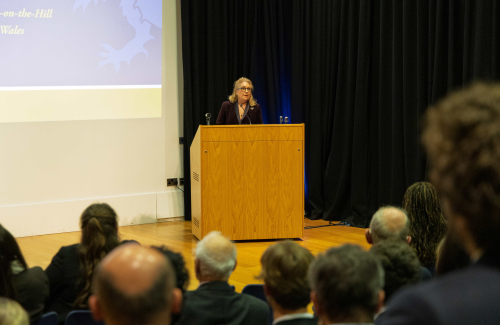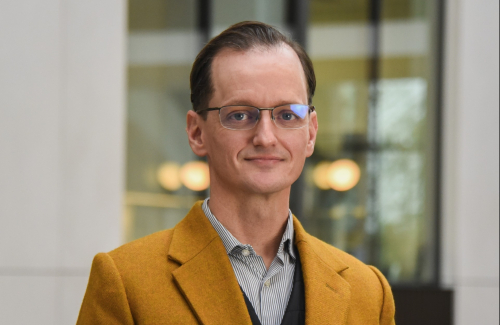More Pembroke news
Pembroke Travels Back Through German History
NEWS |
On 25th November Pembroke welcomed Neil MacGregor, Director of The British Museum. This event report was originally written by Marianna Spring (2014, French and Russian) for publication in the student newspaper Cherwell.
Last Tuesday Pembroke hosted the director of the British Museum Neil MacGregor for a lecture on the subject of his BBC Radio 4 series and feature exhibition at the Museum; “Germany: memories of a nation”. All Pembrokians, as well as members of other colleges, were invited to book tickets for the free hour-long lecture in the newly built Pichette Auditorium, over the course of which Neil MacGregor explored 600 years of German history through art, landmarks, literature and other objects.
The lecture focused on how Germany uses its past, particularly exploring the lack of shared national memory before the fall of the Berlin Wall and Germany's "willingness to live with shameful parts of its history"- in the words of Neil MacGregor. Through the comparison of coinage, bank notes and even Hitler paper dolls, the lecture sought to further the British perception of Germany that is so critical at the centenary of World War One.
"This was the moment to look at different parts of German history," said MacGregor when explaining why this exhibition and radio series were put together now. "Both have received favourable comments in Germany and England."
Neil MacGregor, an Oxford graduate himself, has not only been Director of the British Museum since August 2002 - a role through which he has had the chance to work on a series of projects and radio programmes with the BBC - but has also been Editor of The Burlington Magazine and Director of the National Gallery.
Pembroke’s Master Dame Lynne Brindley explained how Pembroke were lucky enough to have been offered such an exciting opportunity: “Neil is the Director of the British Museum and before I came to Pembroke I held the equivalent position at the British Library – we were great sister cultural institutions, with a shared history, and so Neil and I worked closely together over many years and got to know each other well. He offered to come to speak on his current Germany exhibition and the associated radio series – I was very happy to accept.”
She continued to expand on the importance of holding such lectures at her college: “Now that Pembroke has such a wonderful new set of buildings around its new quad, including the Pichette Auditorium it is possible to organise a much wider range of activities for the benefit of our whole community – whether it is a guest lecture, a concert, film night, research forum, student society, and so on.”
“This high profile lecture is one example of Pembroke’s increasingly vibrant academic, cultural and research programmes for students and Fellows to enjoy and engage with.”
Pembroke undergraduates were equally enthused by this opportunity, particularly relevant around the time of the First World War Centenary that brings German history centre stage.
Fresher Pascal Foster eagerly supported the holding of this special lecture, keen for German history to be explored in more depth: “I think it’s a really good idea to help those who are interested in history gain a free pass to study different parts of history they haven't explored before - especially because it’s free. It’s incredible to have the director of such a recognised museum talking here. I don't really know much about German history other than the two wars, as there’s so much emphasis on their twentieth century history especially at the moment, so it's fascinating to learn about German history in a wider context.”
History undergraduate Flora Raybould was equally fierce in her praise: “High profile lectures like this would normally be held outside of college, so its great to have such fantastic opportunities literally right on our door step and that the college is encouraging the study of history by all - not just us history students.”
German student Emma Corris, who attended the lecture, commented on how much she enjoyed it: "He spoke so fluidly it didn't feel like a lecture at all, but rather part of discussion about fascinating details of German history that we don't often discuss. The symbolism of the Reichstag Parliament was so interesting. I hadn't realised that the graffiti from the Soviet occupation had been left there as a reminder to politicians of how their government failed its people or the relationship between the memorial outside and the parliament itself. I think it's vital that we try and understand all of Germany's history, especially at a time when there has been an increased leaning towards right wing politics. It's important that we don't unfairly stereotype."

